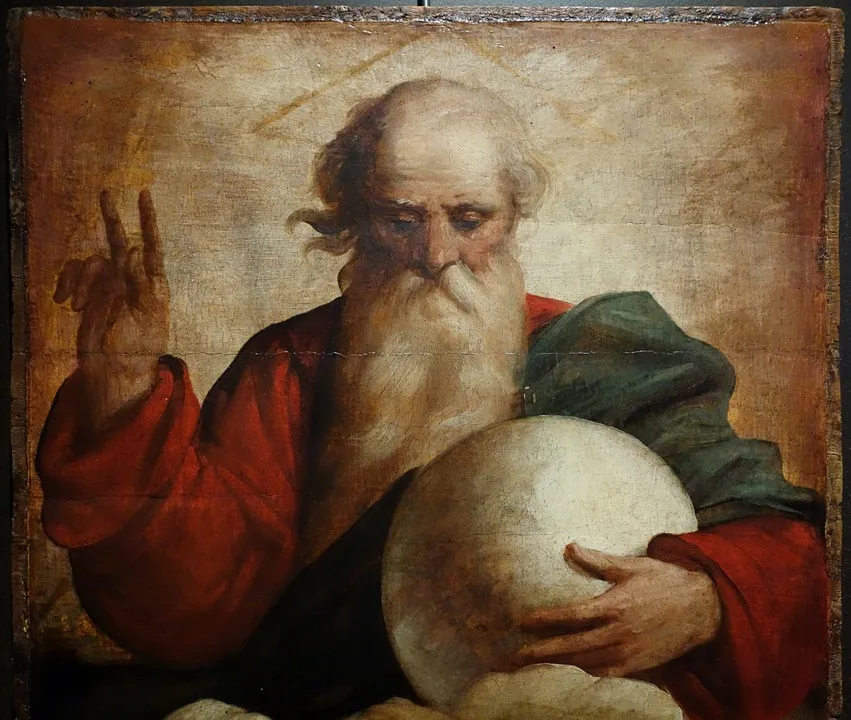For many, the question has remained a mystery – has anyone ever seen God? The search for an answer has taken on theological, philosophical, and even scientific perspectives. This blog explores mystical experiences, religious narratives, and personal reflections to provide insights into how we interpret the divine. Keep reading to discover the many perspectives on encountering the divine.
Theology and Philosophical Perspectives

If you’re asking yourself, “has anyone ever seen God?” it’s likely that you’re interested in learning about the various perspectives on theology and philosophy surrounding this question.
Here are some important points to consider:
-
Different religions have different theological views on whether it’s possible to see God. For example, Christians believe that Jesus is the only way to see God, while Muslims believe that seeing God is only possible in the afterlife.
-
Philosophically speaking, some argue that God’s existence cannot be proven or disproven, and therefore the question of whether anyone has seen God is irrelevant. Others argue that God can be experienced through nature or personal enlightenment.
-
Theology and philosophy also explore the nature of God – is God a physical being that can be seen, or is God an abstract concept that cannot be seen? Different perspectives yield different answers to this question.

It’s important to note that theological and philosophical perspectives are complex, nuanced, and often debated. The best way to gain a comprehensive understanding of these perspectives is to conduct further research and engage in theological discussions.
Here are some additional resources to consider:
- [BOOK] “The God Delusion” by Richard Dawkins
- [PODCAST] “The Liturgists”
- [VIDEO] “The Problem with God” TED Talk by Lesley Hazleton
Overall, exploring different theological and philosophical perspectives is an important step towards answering the question of whether anyone has ever seen God.
Mystical and Spiritual Accounts of Divine Encounters
Have you ever wondered if anyone has ever seen God? While some religious texts speak of divine encounters, mystical experiences, or visions of God, these accounts are often shrouded in mystery and symbolism.
However, many individuals have shared their personal experiences of encountering the divine, which have been attributed to a higher power or divine presence. These experiences may come in the form of a spiritual awakening or a deep sense of enlightenment, leading to a transformational change in one’s life. In some cases, individuals may experience a feeling of oneness with the universe and a sense of peace and love beyond comprehension.
Religious traditions and cultures have their own unique accounts of divine encounters. In Christianity, for example, stories of individuals seeing visions of God, angels, or other divine beings are common. The Bible speaks of Moses encountering God in the burning bush and the apostle Paul receiving a divine revelation on the road to Damascus. Similarly, Hinduism has a rich tradition of mystical experiences and encounters with the divine, from ancient texts like the Vedas and Upanishads to modern-day gurus and spiritual teachers.
Some argue that these mystical experiences are purely subjective and cannot be verified by empirical evidence. However, others maintain that these experiences are real and meaningful, serving as a source of guidance and inspiration in their spiritual journey.
The role of faith and belief in encountering the divine cannot be overlooked. For many, it is their belief in a higher power or divine presence that allows them to open themselves up to the possibility of experiencing the divine. These experiences may reinforce their beliefs or challenge them to reconsider their theological perspectives.
From a scientific and psychological perspective, religious experiences are often viewed as neurological events that occur within the brain. However, some scholars argue that these experiences are more than just a product of the brain and are instead windows into a deeper spiritual reality.

Ultimately, the question of whether anyone has ever seen God remains a mystery and may be impossible to answer definitively. However, it is clear that the accounts of mystics, spiritual seekers, and religious traditions hold a special place in the hearts of believers, serving as a source of spiritual comfort, inspiration, and hope.
Religious Narratives and Views on Seeing God
When it comes to the question “has anyone ever seen God?” religious narratives offer a multitude of answers. From mystical experiences to divine intervention, many believers have reported seeing God or experiencing the presence of the divine in their lives.
Here are some examples of religious perspectives on seeing God:
-
Judaism: In the Old Testament, Moses spoke to God face-to-face and even saw His back. Abraham also had a firsthand encounter with God when he was asked to sacrifice his son Isaac, but was stopped at the last minute. However, in Judaism, it is believed that seeing God in his full glory is impossible as no mortal can withstand the boundless light of the divine.
-
Christianity: According to the New Testament, several individuals saw Jesus as the physical manifestation of God on earth. St. Paul had a powerful encounter with Jesus on the road to Damascus which led to his conversion. However, in Christianity, it is also believed that it is impossible for humans to fully comprehend the nature of God as He is beyond human comprehension.
-
Islam: In Islam, Allah is seen as the one true God and said to be beyond human comprehension. However, the Prophet Muhammad is believed to have had a series of spiritual experiences where he received revelations from Allah. He is also said to have had an ascension to heaven where he witnessed the divine presence.
-
Hinduism: In Hinduism, there are many stories of gods manifesting on earth to interact with humans. For example, Lord Rama is said to have been an incarnation of the god Vishnu and Lord Krishna is believed to be a manifestation of the divine, with devotees seeing Him during worship.
-
Buddhism: In Buddhism, the concept of God is less defined, but there are instances where devotees have reported seeing the Buddha or having spiritual experiences in meditation.
It is important to note that these religious narratives do not offer concrete evidence of the existence of God. Instead, they serve as a source of inspiration and guidance for believers on their search for the divine.
In summary, seeing God is a subjective experience and varies greatly depending on religious beliefs and experiences. Nearly all religions acknowledge that the nature of God is beyond human understanding, but many also offer examples of individuals who have encountered the divine in some shape or form.
Personal Reflections on Experiencing the Divine
If you’ve ever had an encounter with the Divine, it’s a powerful and life-changing experience. The presence of God can be felt in many different ways, whether it’s through prayer, meditation, worship, or even just spending time in nature.
« Unveiling the Secrets of Tammuz in Ancient Mesopotamian Mythology
Unveiling the Identity of Tychicus: A Faithful and Trustworthy Servant of Apostle Paul in the Bible »
As a youth pastor, I’ve been privileged to hear many stories of young people who have experienced the presence of God in their lives. Some have had supernatural encounters, while others have experienced a deep sense of peace and comfort during difficult times.
One young woman in my youth group shared with me that she had been going through a particularly challenging time in her life when she had a dream one night. In the dream, she saw Jesus standing before her, and he reached out his hand to her. She said she felt overwhelmed with a sense of love and comfort, and woke up feeling renewed and strengthened. She knew that it was a message from God that she was not alone and that he was with her in her struggles.
Another young man shared with me that he had always struggled with doubt and uncertainty about his faith, but one morning during his daily prayer time, he suddenly felt an overwhelming sense of peace and clarity. He described it as a veil being lifted from his eyes, and he suddenly felt a deep understanding of God’s love for him and his purpose in life.
These personal reflections are just a few examples of the many ways in which people can experience the presence of God in their lives. Whether through visions, dreams, a sense of peace, or just a deep knowing, these encounters can be life-changing and transformative.

Of course, not everyone has had such profound experiences, and that’s okay too. The important thing is to keep an open heart and mind and to seek God in whatever way feels most authentic and meaningful to you. As the Bible says, “Seek and you shall find” (Matthew 7:7).
In the end, there is no one right way to experience the Divine, and everyone’s journey is unique and personal. But one thing is certain – when we open ourselves up to God and invite him into our lives, amazing things can happen, and we can experience the transformative power of his love and grace.
The Role of Faith and Belief in Seeking God
When it comes to the age-old question of whether anyone has ever seen God, faith and belief play a crucial role in seeking answers. For many, the belief in a higher power is rooted in their faith and religious teachings. It is through the lens of their religious beliefs and practices that they seek to encounter the divine and connect with God.
Here are some ways faith and belief impact the search for the divine:
-
Faith as a Catalyst for Seeking God:
For those who have faith in a higher power, seeking to encounter the divine is a natural inclination. They believe that God is present and active in their lives and that they can experience the divine through prayer, worship, and other spiritual practices. -
Belief in the Mystical and Transcendent:
Many religious traditions speak of the possibility of encountering the divine through mystical experiences. These experiences are often described as moments of transcendence, where individuals feel a sense of oneness with the divine and the universe. Believing in these mystical experiences and the possibility of encounters with the divine can fuel the search for God. -
Trust in Religious Narratives:
Religious narratives and scripture shape the understanding of God for many people of faith. Believing in the truth of these stories and teachings can lead individuals to seek a deeper understanding of their faith and a closer relationship with God. -
Personal Beliefs and Experience:
One’s personal beliefs and experiences can also play a role in seeking the divine. For those who believe in the presence of God in their lives, they may look for signs and experiences that confirm this belief. This can include feelings of peace, guidance, or a strong sense of purpose. -
Faith and the Search for Meaning:
For many believers, the search for God is also a search for meaning and purpose in life. They look to their faith to provide guidance and a moral compass, and seek to connect with God as a way of finding deeper fulfillment and a sense of belonging.

Seeking the divine is a deeply personal and often complex journey, and faith and belief can play a significant role in this process. Whether it’s through religious practices, mystical experiences, or personal beliefs and experiences, the search for God can be a source of comfort, guidance, and transformation for many who believe.
Scientific and Psychological Perspectives on Religious Experiences
When it comes to questions about experiencing the divine, scientific and psychological perspectives can offer some interesting insights. While faith and belief play a critical role in religious experiences, there are also physical and psychological aspects that impact how we perceive and interact with the world around us.
From a scientific perspective, there are a few theories surrounding religious experiences. One is that such experiences are simply a result of brain activity – specifically, the areas of the brain responsible for perception and emotions. Some scientists suggest that spiritual and religious experiences can be tied to specific neurological processes that trigger intense feelings of awe, elation, or peacefulness. Others point to the role of cultural and environmental influences in shaping beliefs and experiences.
Psychologically-speaking, religious experiences have long been of interest to scholars and practitioners alike. Some consider mystical experiences – moments of encountering the divine – to be a natural outgrowth of human development. In other words, they may be a part of our psychological makeup as humans. Others propose that spiritual experiences reflect a deepening of one’s personal beliefs or suggest an underlying need for a sense of purpose or meaning.
As a Christian, it’s important to consider how these scientific and psychological theories interact with our faith. While they can offer valuable insights, they don’t necessarily negate the reality of encountering God. For example, scientific explanations of prayer or meditation may only hint at the underlying spiritual significance of these practices, rather than dismiss them altogether.

Ultimately, our faith and beliefs are deeply personal, and so are our experiences of the divine. While science and psychology can provide possible explanations for how and why we experience God, they cannot fully explain the mystery and wonder of encountering the divine. For many, faith and belief offer a foundation for seeking God and experiencing his presence in their lives. By exploring scientific and psychological perspectives alongside religious ones, we can deepen our understanding of what it means to be spiritual, while still harboring awe and wonder for the divine.












